A wedding bomb, a letter and an unlikely suspect
- Published
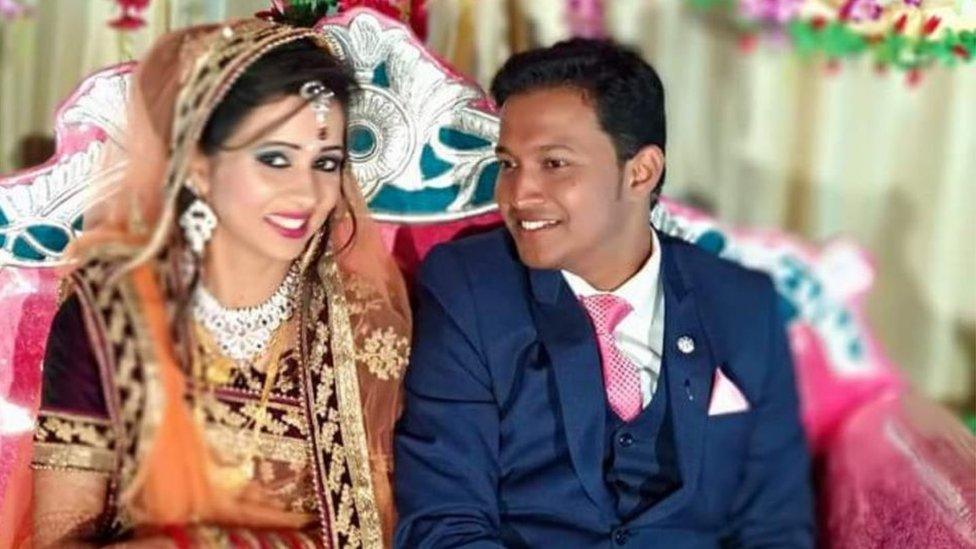
After a massive search, police in India have arrested a college teacher in connection with a "wedding bomb" that killed a newly-married man and injured his wife. Soutik Biswas reports on how the investigation into a killing which shocked India took an unexpected turn.
The letter arrived in a stamped envelope on a hot summer morning in early April.
The sender had printed "Important Letter" on a piece of paper and addressed it to the police chief of Balangir, a rural district in Orissa state studded with temples and farms.
It was an anonymous and rather strangely-written letter containing 130 words printed in English on white foolscap. And it related to the recent wedding gift bomb murder in the district.
Soumya Sekhar Sahu, a 26-year-old software engineer, had been killed and his 22-year-old wife Reema seriously injured when he opened a parcel addressed to him, five days after their marriage in February.
Sahu's 85-year-old great aunt was also killed in the explosion at the family home in the sleepy town of Patnagarh.
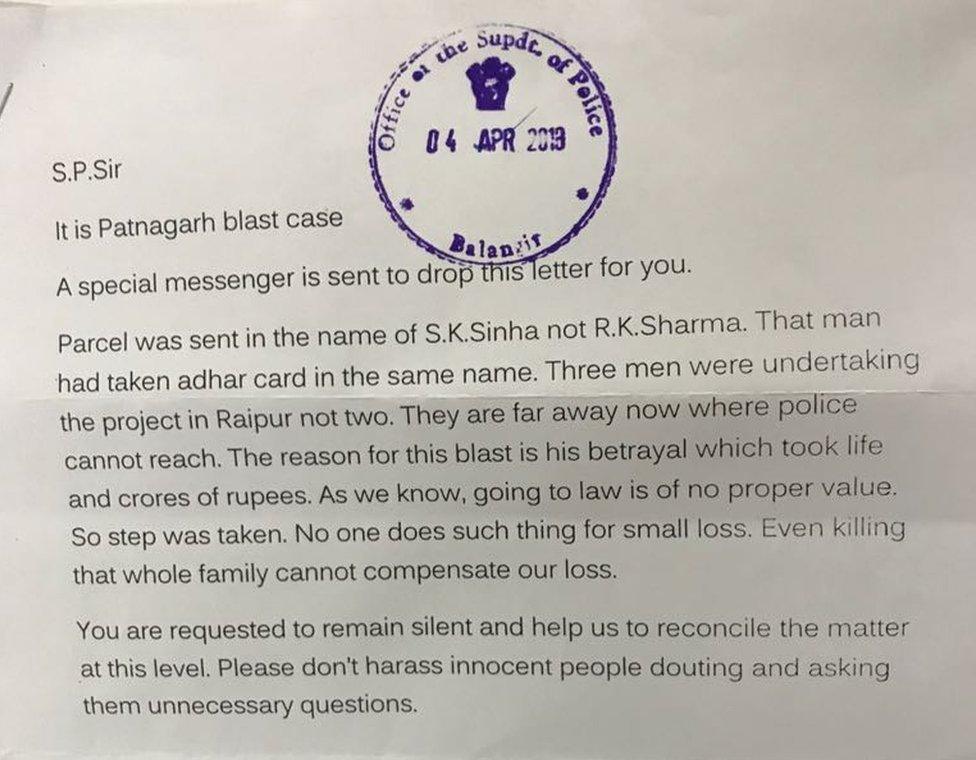
The anonymous letter provided the first clue
Police said the parcel had been sent by someone called SK Sharma from Raipur, some 230km (142 miles) away in neighbouring Chhattisgarh state. Both the name and address were found to be fake, police say.
The letter they say was sent to the Balangir police chief began with the disclaimer that a "special messenger" had been sent by the writer to "drop this letter". And then, it came to the point quickly.
The parcel with the bomb had been sent in the name of SK Sinha, not RK Sharma, it said. Three men, it said, had "undertaken the project" and they "were far away now where police cannot reach". The reasons for the blast, the sender wrote with an awkward flourish, were the groom's "betrayal" and money. The first reason possibly alluded to a scorned lover, and the second to a property dispute.
"Even the killing of the whole family cannot compensate our loss," the sender wrote.
In the end, the tone turned forceful. The police, wrote the sender, should "remain silent" and "not harass innocent people, doubting and asking them unnecessary questions".
For more than a month, two dozen investigators questioned more than 100 people - friends and relatives of the couple mainly - in four cities in connection with the killing. They had scoured thousands of mobile phone records, and scanned laptops and phones belonging to the couple.
Investigators had looked into a threatening call the victim received last year after his engagement, and found out it was from a young man known to his then fiancée who had blamed her for "ditching him and getting engaged to a richer boy". Encouraged by the lead, they had picked up the man and questioned him. They let him go after they found nothing amiss beyond a "silly threat" on the phone.
Detectives had also drawn up a list of more than a dozen possible suspects, but had no firm leads on any of them. The case was going cold. As public and media pressure grew, the government handed the case over to the elite crime branch.
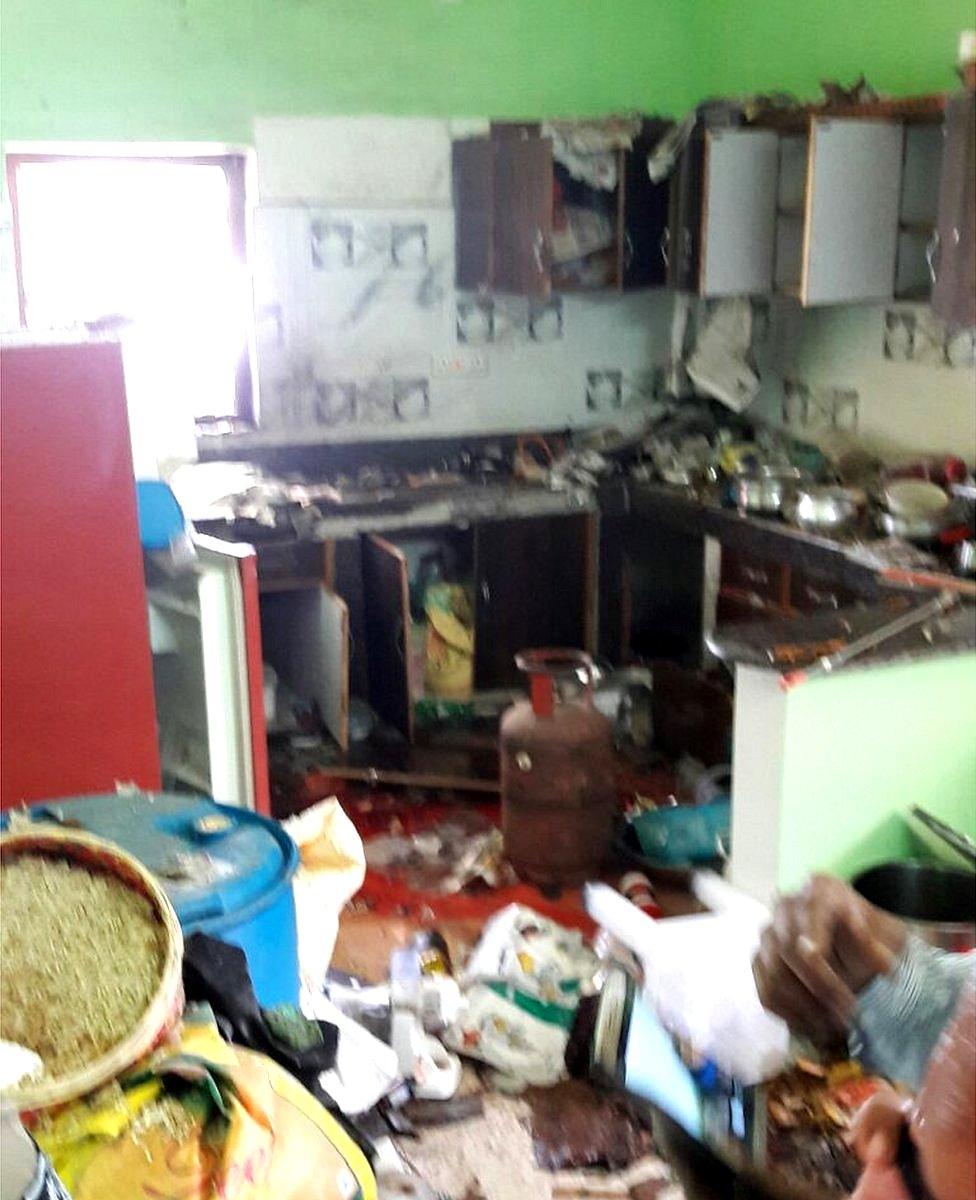
A video grab of the Sahu's kitchen moments after the blast
More than 300km (186 miles) away in the state capital, Bhubaneshwar, crime branch chief Arun Bothra received a scan of the letter on WhatsApp. Mr Bothra, a 50-year-old journalist-turned-policeman, was taking over the investigation.
"I read the letter the whole day and night. I must have read it a hundred times. It revealed a lot of things," he told me.
"It was clear that the sender knew more about the crime than we did. By writing that it was being sent by a messenger, he wanted to tell us that the crime was not the work of a local man. He wanted to tell us that the plot was executed by three people. He wanted to be taken seriously, so he was kind of blowing his fake cover by pointing out a mistake we had made," Mr Bothra said.
Mr Bothra sought records of the case. He found that the police had bungled while deciphering the parcel booking receipt - the untidy and hurried scrawl of the sender's name did not appear to resemble SK Sharma.
"If you observe the writing closely, the name is more akin to SK Sinha or SK Singh - look at the loop in the end. And the police, the media, the survivors all kept repeating the sender was SK Sharma. And since we knew he had used a fake name, we did not bother about it."
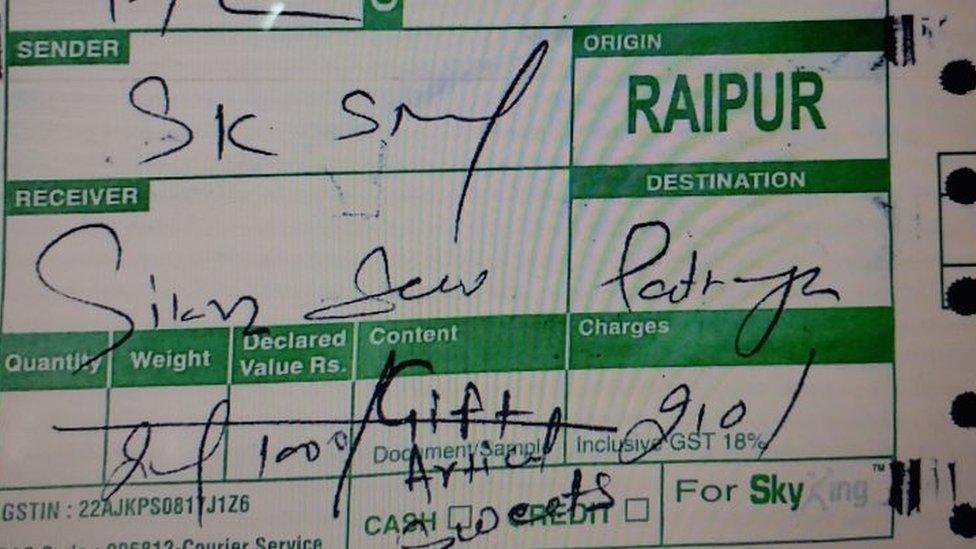
The police read the recipient's 'fake' name wrongly
"I kind of instantly sensed the killer had himself sent the letter. How did he know that SK Sinha had sent the parcel? He had made a big mistake. The letter was the turning point in our investigation."
Forensic scientists say they found a number of faint, unhelpful fingerprints on the letter. They sent the envelope to extract a genetic profile from the saliva the sender may have used on the glue seam, but none was found.
Investigators sent a copy of the letter to the parents of the victim. They were asked whether they suspected anyone. The victim's mother, a teacher in a local college, went over the letter again and again.
"It was then the mother said this letter could have been written by a colleague of hers who taught English at the college. She said he had a similar writing style and choice of words. Then she said something interesting. She said the teacher would often use the phrase 'completing the project'," said Mr Bothra.
Workplace rivalry
Punji Lal Meher, 49, had been called in for questioning a week after the fatal blast. The victim's mother had told police that he harassed her after she replaced him as principal of the college last year. The two had reportedly humiliated each other in public, but in the end Mr Meher appeared to have swallowed his pride.
"We had really found nothing to pursue Mr Meher. There was never a lead really. We thought it was a case of usual workplace politics," one investigator told me.
In his Facebook posts, Mr Meher is usually dressed in formal suits and blazers, a mark of an upwardly mobile man. He wears a gold-coloured watch, a prominent gold ring, and shiny ties, belts and shoes. In one picture, he sits astride a motorcycle, wearing an orange shirt and sunglasses.
In other pictures, he is giving away medals at college functions, addressing an Aids awareness meeting, attending a yoga conference. His personal information details say he joined the college in 1996, became the principal in 2014. He's less prolific on Twitter. "There should be only one religion - the religion of humanity," he tweeted in February 2016.
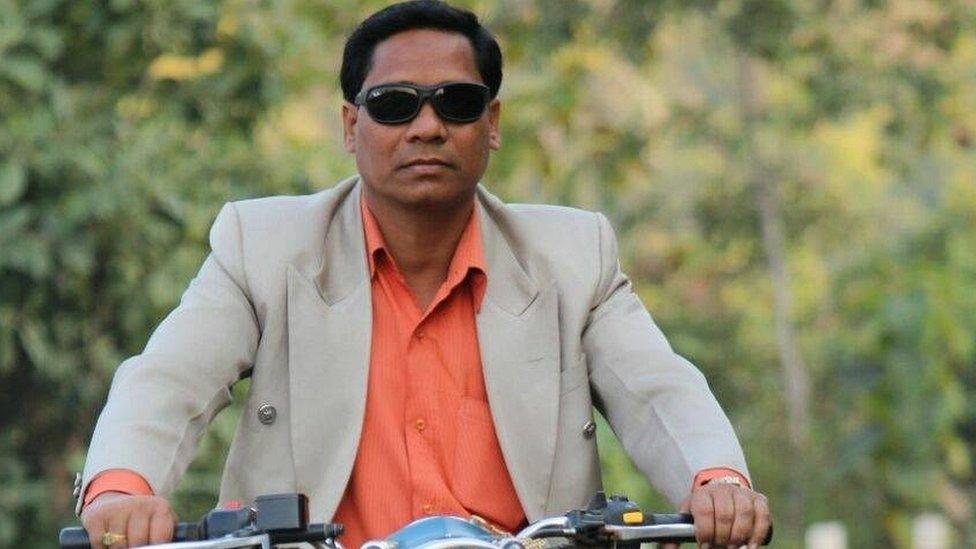
Mr Meher was replaced by the victim's mother as the principal of the college
It was time to rethink the case and bring in Mr Meher for questioning, Mr Bothra told investigators. So they did.
Mr Meher is alleged to have told police that he was out on his evening walk, when a man stopped him, gave him a letter and threatened to harm him if he didn't travel to Balangir town and deliver the letter.
"It was the most incredible story that we've heard from a suspect," says Mr Bothra.
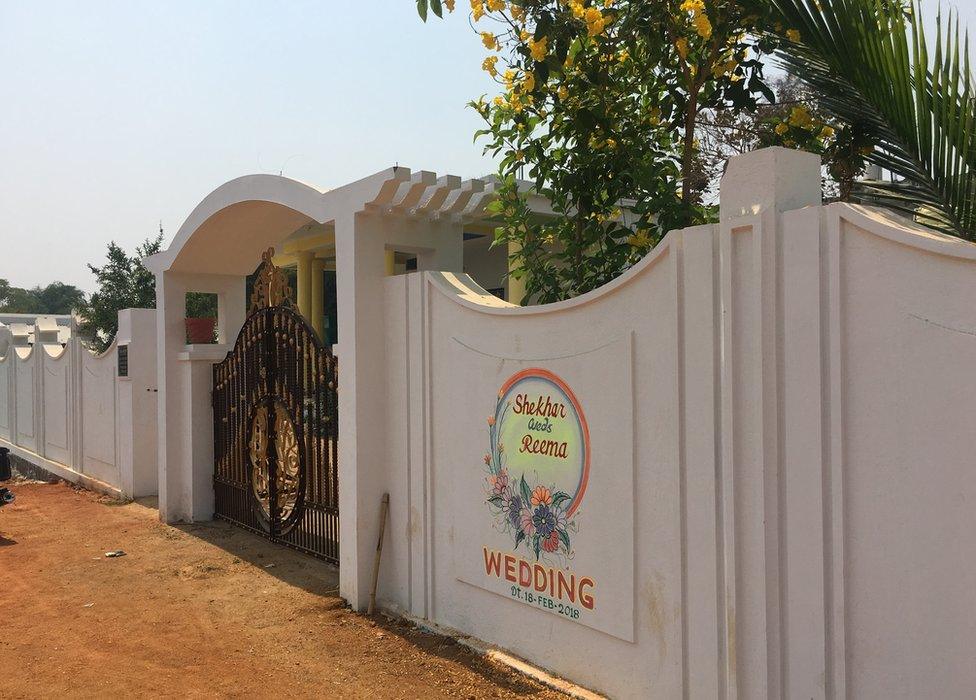
More than 800 people attended the reception at Mr Sahu's house
According to police, Mr Meher said he began buying and hoarding firecrackers in October, when India celebrated Diwali, the festival of lights. He is alleged to have hoarded gunpowder from the crackers, from which they say he made the bomb. In a couple of months, it was ready, police say. They believe he then put it in a cardboard box and gift-wrapped it.
On a balmy morning in February, he was ready to send the bomb to its destination, investigators say.
He attended college in the morning, took a class, returned home, picked up the gift-wrapped parcel and went to the nearest railway station on his bike, leaving his Datsun sedan at home, it is alleged. He kept his phone at home in what police believe was an attempt to create an alibi that he never left his house. He then took the two-and-half-hour train journey to Raipur without a ticket to avoid being captured by CCTV cameras at the station ticket counter, police say.
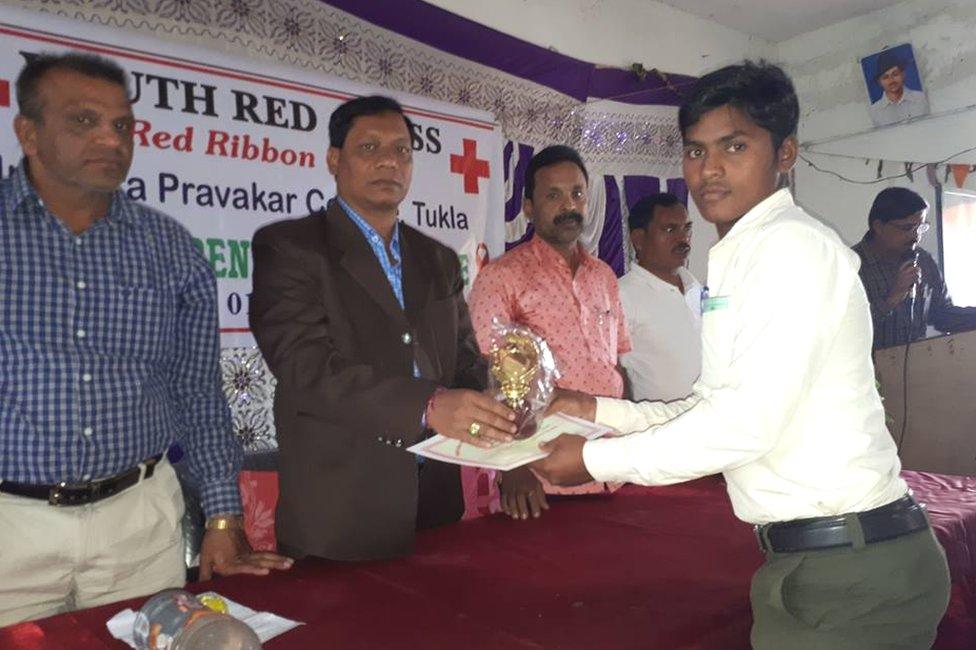
Mr Meher was a regular fixture at community events
The police theory is that in Raipur, he took a cycle rickshaw and then a tuk-tuk to visit two courier services before deciding on one located in a basement. According to reports, at the first shop a woman employee asked the rickshaw puller about the contents of the parcel. Mr Meher is alleged to have panicked, walked into the shop and took back the parcel. (The police are seeking to retrieve CCTV footage from the shop.)
After booking in the lethal parcel - with the contents given as "gift articles, sweets" - police say Mr Meher told them he took the evening train back and was in bed at home by midnight. In less than a week the parcel then made a 650km journey on three buses and passed through four pairs of hands before reaching Patnagarh on 20 February. Three days later, the bomb exploded in the Sahu house. Mr Meher attended the marriage - and funeral of the victim.
"I was consumed by rage and hatred. I could not swallow the humiliation," Mr Meher is alleged to have told the police last week.
Mr Meher is currently in police custody while the investigation continues, and is yet to enter a plea.